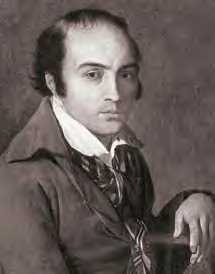Andre Chenier (Andre Chenier)

Poet. Born in Constantinople – what is today Istanbul, Turkey – the son of Louis Chénier, the French consul in Constantinople, and Elisabeth Santi-Lomaca of Greece. In 1773 he enrolled in the Collège de Navarre in Paris. In 1783 he became a cadet in a French regiment at Strasbourg, he had no affinity for military life, however, and within six months he was back in Paris. He then took a post as secretary with the French Embassy in London when he made a study of English literature. He returned to France in 1790, a moderate in support of the Revolution. He became a member of the Society of ’89, the moderate wing of the revolutionary party, and began a dangerous foray in political journalism, attacking the extremists in both the monarchist and republican camps. In 1792, he wrote in defense of Louis XVI, he also wrote the famous ‘Ode à Marie-Anne-Charlotte Corday’ after the young woman’s execution for the assassination of Marat. In 1793, the Moderate party was obliterated and the Journal de Paris, where he had been published, was suspended. Chénier retired from public life and he spent much of his time at Rouen and Versailles writing; resulting in such works as ‘Ode à Versailles.’ On March 7, 1794 while visiting Passy, he was arrested by agents of the Committee of Public Safety who were seeking a fugitive aristocrat, and he was arrested on suspicion of being the aristocrat. He was sent to St. Lazare Prison where he incarcerated with inmates such as the poet Jean-Antoine Roucher, Louise de Laval-Montmorency, abbess of Montmartre, artist Joseph-Benoît Suvée, and Aimée de Coigny, Duchess of Fleury, who became his final muse. One of his last works was ‘La Jeune Captive.’ In July 1794, he was taken before the Revolutionary Tribunal, where he was tried for crimes against the state. Chénier was condemned to death. He and his friend Roucher, recited verses from Racine’s ‘Andromaque’ while riding in the cart on their way to the guillotine. His death came some two weeks before the end of the reign of terror. He was interred in the mass grave that would become the Cimetière de Picpus. In his lifetime, only two of his poems were published; it was not until 1819 that an attempt was made to collect his poems for publication at which time he became an icon for the Romantic Movement. His life inspired numerous poems by such authors as Victor Hugo and Alfred de Musset as well as the opera, ‘Andrea Chénier’ by Umberto Giordano. Chénier is widely considered the greatest French poet of the 18th century. (bio by: Iola)
Born
- October, 30, 1762
Died
- July, 07, 1794
Cemetery
- Picpus Cemetery
- France

